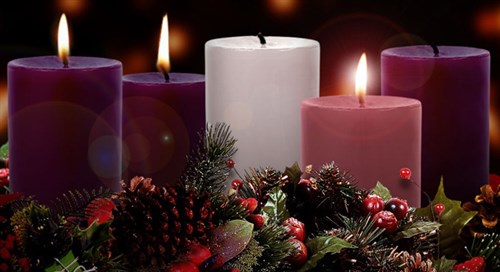Today’s readings and liturgy call us to rejoice. That’s the reason for the rose-colored vestments and the more joyful tone of today’s readings. This is called Gaudete Sunday: gaudete being Latin for “rejoice,” the first word of today’s introit or proper entrance antiphon which says: “Rejoice in the Lord always; again I say, rejoice. Indeed the Lord is near.”
Today we rejoice because our Lord is near. We light that third, rose-colored candle on our Advent wreath and we see there’s just one candle left until the feast of the reason for our rejoicing. We rejoice, too, that we can come to him for help and sustenance and companionship on the journey to healing. We look forward to celebrating the Incarnation, perhaps the greatest and best of the mysteries of faith. That God himself, who is higher than the heavens and greater than all the stars of the universe, would humble himself to be born among us, robing himself with our frail flesh, in order to save us from our sins, heal our brokenness, and make his home among us for all eternity – that is a mystery so great it cannot fail to cause us to rejoice! Indeed that very presence of God gives hope even in our most difficult moments – THE LORD IS NEAR!
During my trip to Israel this past fall, I got a sense of what Isaiah is talking about in today’s first reading. When we were there, it was unseasonably hot. I remember that we went up to the top of Masada, in the desert, and it was oppressive. I was even worried for some of the less able pilgrims that were with us. By contrast, we also visited Carmel, and even up at the top of the mountain, it was refreshing (actually it was raining a bit, so very refreshing!). Also, at the top of Masada, all you could see was brown, parched desert. At the top of Carmel, you could see all around Israel, with bodies of water, and villages.
They were different experiences, and it sheds light on what Isaiah is saying. If the desert were to bloom with abundant flowers, and be given the splendor of Carmel, that would indeed be reason to rejoice. But what would cause such a miraculous turn of events?
Many times when I have had occasion to anoint a person having surgery, or battling an illness, I have read the first part of the Gospel reading we heard today. Jesus tells the disciples of John the Baptist to tell him what they have seen and heard: the blind regain their sight, the lame walk, lepers are cleansed, the deaf hear, the dead are raised, and the poor have the good news proclaimed to them. Again, any one of these would be reason enough to rejoice. But again, what would cause such a miraculous outpouring of events?
Well, we all know what caused all these miraculous events to burst forth upon the earth: the glorious coming of our Savior, Christ the Lord. Our God who, as the Psalmist says, keeps faith forever, has turned to us in our need and become one of us, giving us a completely new life, where sin and death and disease, and even the scorching heat of desert have no power over us. Our God remembers his promises: he “gives food to the hungry. The LORD sets captives free. The LORD gives sight to the blind; the LORD raises up those who were bowed down. The LORD loves the just; the LORD protects strangers.” Because our God is not a god who sets events in motion and then steps back to see them all flounder in desperation, but instead, he is a God that cares for every one of us as if we were the only one on earth. Our God would have come to save us even if we were the only one who needed saving. Our God, THE LORD IS NEAR! Indeed we ought to rejoice!
These final days of Advent call us to prepare more intensely for the Lord’s birth. They call us to clamor for his Incarnation, waiting with hope and expectation in a world that can sometimes be dark and scary. These days call us to be people of hope, courageously rejoicing that the Lord is near! Come, Lord Jesus! Come quickly and do not delay!
In our silent time after the homily today, I invite you to pray with me. I want you to picture Jesus coming to you, approaching you, and extending his hand to you. He wants to give you a message of hope and encouragement. He wants to tell you that you are important to him, that he came to save you. What is he saying to you as he approaches? What is hopeless in you right now that he offers to sustain you through? What is he saying to you on this day of rejoicing?
